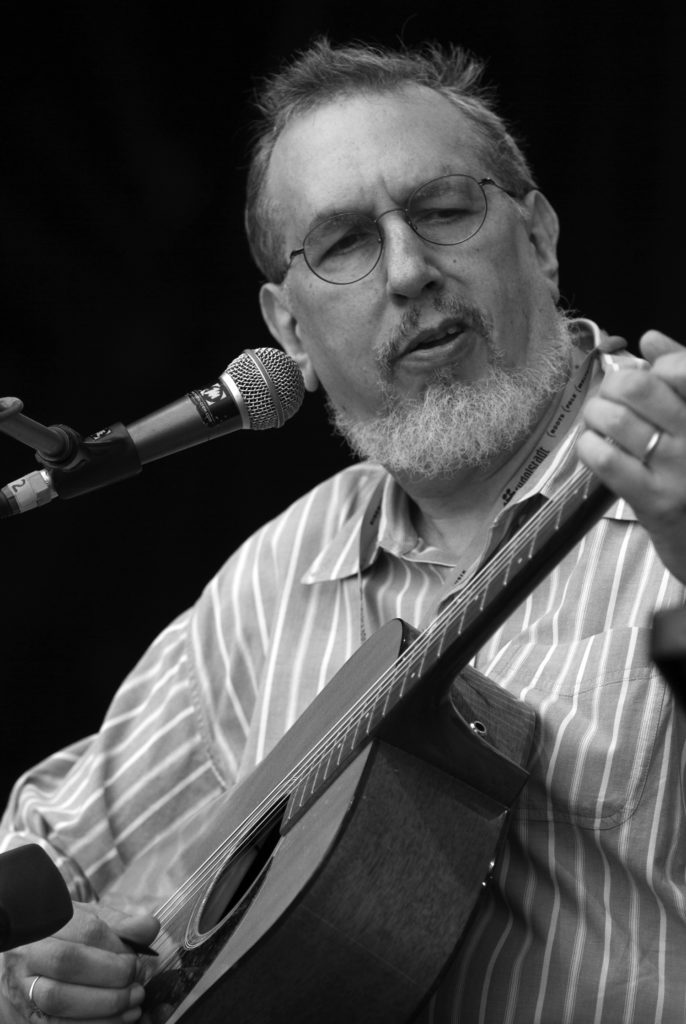David Bromberg
“The reason man created stringed instruments – David touched them with a lover’s fingers and they moaned that true love right back at him. Wood and wire and flesh spoke.” — Jerry Jeff Walker
 He can awe an audience into pin-drop silence with a solo acoustic blues or goose his fans to their feet with a bluegrass reel by his Quartet or an R&B romp by his Big Band. David Bromberg has spent his life absorbing traditional music from its surviving creators and their recordings so convincingly – while adding his own instrumental twists – that he has become a part of musical tradition itself, as close to the source of American roots music as anyone alive. Folk, blues, bluegrass, ragtime, you name it – he has become The Real Deal.
He can awe an audience into pin-drop silence with a solo acoustic blues or goose his fans to their feet with a bluegrass reel by his Quartet or an R&B romp by his Big Band. David Bromberg has spent his life absorbing traditional music from its surviving creators and their recordings so convincingly – while adding his own instrumental twists – that he has become a part of musical tradition itself, as close to the source of American roots music as anyone alive. Folk, blues, bluegrass, ragtime, you name it – he has become The Real Deal.
Born in Philadelphia in 1945 and raised in Tarrytown, NY, “as a kid I listened to rock ’n’ roll and whatever else was on the radio,” says Bromberg. “I discovered Pete Seeger and The Weavers and, through them, Reverend Gary Davis. I then discovered Big Bill Broonzy, who led me to Muddy Waters and the Chicago blues. This was more or less the same time I discovered Flatt and Scruggs, which led to Bill Monroe and Doc Watson.”
Bromberg began studying guitar-playing when he was 13 and eventually enrolled in Columbia University as a musicology major. The call of the Greenwich Village folk scene in the mid-’60s drew David to the downtown clubs and coffeehouses, where he could watch and learn from the best performers, including primary sources such as his inspiration and teacher, the Reverend Gary Davis.
Bromberg’s sensitive, blues-based approach to guitar-playing earned him jobs playing the Village “basket houses” for tips, the occasional paying gig, and lots of employment as a backing musician for Tom Paxton, Jerry Jeff Walker and Rosalie Sorrels, among others. He became a first-call, “hired gun” guitarist for recording sessions, playing on hundreds of records by artists including Bob Dylan (New Morning, Self Portrait, Dylan), Link Wray, The Eagles, Ringo Starr, Willie Nelson, and Carly Simon. In the early ’90s, David produced an as-yet-unreleased Dylan album, although two tracks have been issued as part of Dylan’s “Bootleg Series.”
An unexpected and wildly successful solo spot at the 1970 Isle of Wight Festival in Great Britain led to a solo deal with Columbia Records, for whom David recorded four albums. His eponymous 1971 debut included the mock-anguished “Suffer to Sing the Blues,” a Bromberg original that became an FM radio staple, and “The Holdup,” a songwriting collaboration with former Beatle George Harrison on which Harrison also played slide guitar. David, who had met the Grateful Dead’s Jerry Garcia at the Woodstock Festival when they both took refuge from the rain in a tepee, wound up with four Dead members, including Garcia, playing on his next two albums.
Bromberg’s range of material, based in the folk and blues idioms, continually expanded with each new album to encompass bluegrass, ragtime, country, and ethnic music, and his touring band grew apace. By the mid-’70s, the David Bromberg Big Band included horn players, a fiddler, and several multi-instrumentalists, including David himself.
Despite jubilant, loose-limbed concerts and a string of acclaimed albums on the Fantasy label, Bromberg found himself exhausted by the logistics of the music business. “I decided to change the direction of my life,” he explains. So David dissolved his band in 1980, and he and his artist/musician wife, Nancy Josephson, moved from Northern California to Chicago, where David attended the Kenneth Warren School of Violin Making. Though he still toured periodically, the recordings slowed to a trickle and then stopped.
After “too many Chicago winters,” in 2002 David and Nancy moved to Wilmington, Del., where they currently serve as unofficial “artists in residence” and where David established David Bromberg Fine Violins, a retail store and repair shop for high-quality instruments. Frequent participation in the city’s weekly jam sessions helped rekindle Bromberg’s desire to perform music “live” again, and the encouragement of fellow musicians Chris Hillman (The Byrds, Desert Rose Band, Flying Burrito Brothers) and bluegrass wizard Herb Pedersen helped nudge him back into the recording studio. The Wilmington jams also led to the formation of Angel Band, fronted by Nancy and two other female vocalists, with David frequently serving as an accompanist.
Bromberg’s illustrious career has been spotlighted recently by the 2012 documentary “David Bromberg: Unsung Treasure,” which is making the rounds of US and Canadian film festivals. His profile is also being raised by the upcoming release of Bob Dylan’s The Bootleg Series Vol. 10, Another Self Portrait, a multi-disc set that includes unreleased songs from his 1970 Self Portrait sessions, one of three Dylan albums on which David has appeared.
David has continued his musical revitalization with his all-star 2011 Use Me CD and his new 2013 release, Only Slightly Mad, a cornucopia of roots music that David continues to preserve and extend.
To hear more about David Bromberg, check out this NPR special.
For upcoming tour dates, go HERE.
Showing all 2 results


